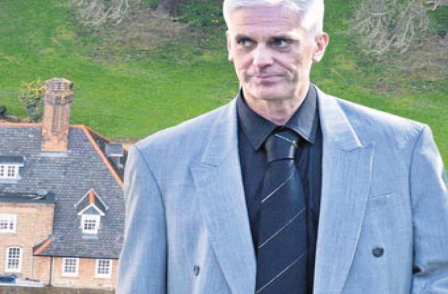
The Sunday Times has accused the Metropolitan Police and Serious Organised Crime Agency of hampering its investigation into underworld boss David Hunt so much that “he nearly got away with it”.
The paper last month won a libel case brought against it by Hunt, known in criminal circles as 'the Long Fella' over a 2010 story about him using violence and intimidation to secure a lucrative land deal in the shadow of the Olympic Stadium in East London.
The Sunday Times has now published more details of the background to the three-year court battle after the time allotted for Hunt to review the judge’s decision expired. This mean's that Hunt will now appeal the verdict.
In a front-page feature in its news review section, the paper criticised the police for initiating legal action against it for breach of confidence. According to the paper, the Met and Soca attempted to prevent the submission of leaked police documents in the libel case to putting lives at risk.
The action resulted in a delay to the Hunt libel trial and almost cost the paper the case, according to Michael Gillard, the journalist who wrote the original story after spending 11 years investigating the crime boss.
The Sunday Times hailed its court victory as a “landmark judgment” in allowing newspapers more freedom to investigate and publish stories on organised crime networks that have evaded justice.
It wrote:
It remains as hard as ever to investigate organised crime. But now a judge has recognised the painstaking way in which journalists build up material, weigh it and test their sources.
Courts sometimes have difficulty seeing the relevance of background information. But reporters can now put together and rely on an inferential case that a person is a crime boss. If the building blocks of organised crime are present and the newspaper is sure of its facts, a person can be called an organised criminal.
This landmark judgment bolsters public safety by increasing the confidence with which newspapers can report on organised crime and police corruption, which tend to go together. But the result, after risking the safety of journalists and huge sums of money, was very hard won. And at one stage the Met and Soca set back the Sunday Times position so far that Hunt nearly got away with it.”
The Sunday Times also revealed details of the lengths it went to protect Gillard and other witnesses during the trial.
One group of minders hired by the paper “walked off the job” after two days having allegedly been approached in a pub after taking on the work, while another security firm turned down the assignment “saying the risk to individuals was too great”.
The paper could have stood to lose up to £250,000 if Hunt had won its case.
“At this point a newspaper has to be honest with itself,” it wrote. “Journalist, editor and in-house lawyer have to ask themselves if they were right to publish and what they could have done better.
“We have a responsibility to own up to our mistakes. But if a newspaper believes in what it publishes and that the public has a right to know, there is no real choice but to fight.”
Email pged@pressgazette.co.uk to point out mistakes, provide story tips or send in a letter for publication on our "Letters Page" blog
